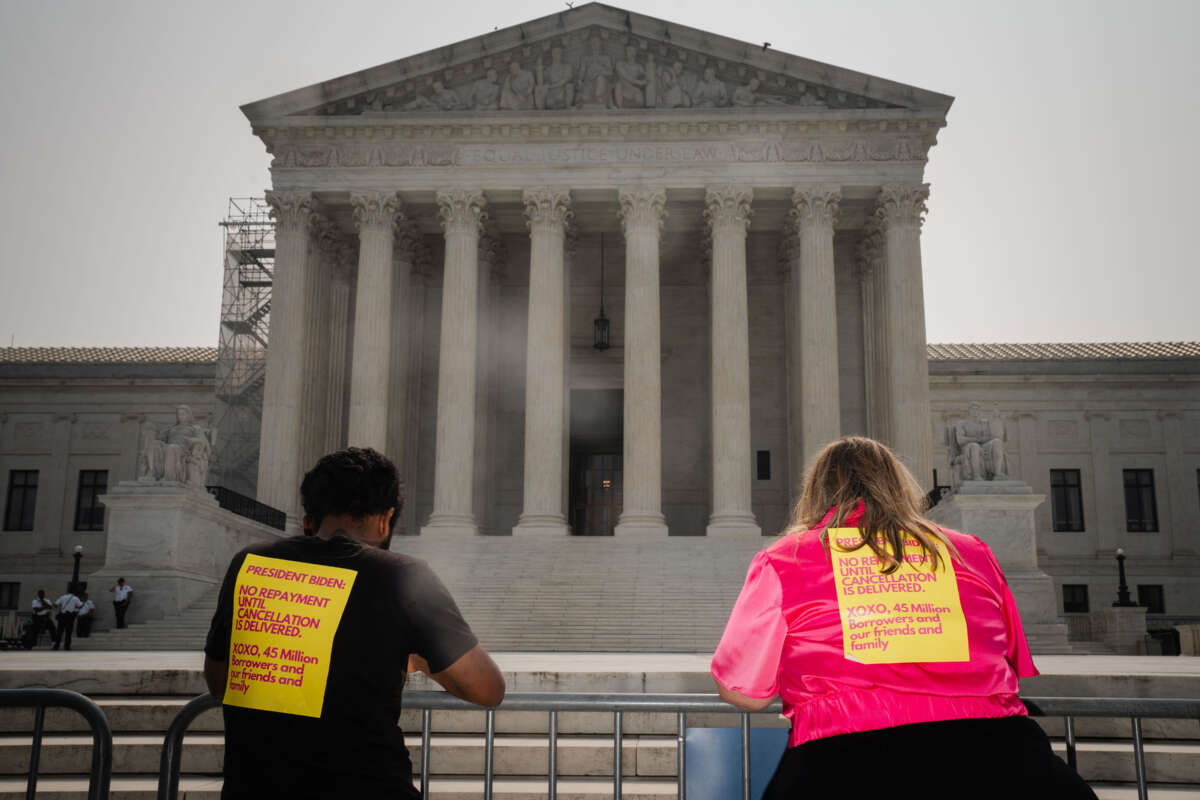Support justice-driven, accurate and transparent news — make a quick donation to Truthout today!
The Supreme Court ruled on Friday to strike down President Joe Biden’s student debt forgiveness plan, yanking away a chance at respite for tens of millions of borrowers across the country based on what advocates and experts have said are faulty, policy-driven viewpoints adopted by the far right Court.
Justices ruled 6 to 3 on Biden v. Nebraska, a case brought by Republican state lawmakers challenging the plan, which would have canceled up to $10,000 of debt for people making less than $125,000 a year and $20,000 for people who received Pell Grants. The ruling is a win for the Republican politicians who brought the case, inflamed by a program that would have provided rare relief to the working class.
The majority opinion was written by Chief Justice John Roberts, siding with six Republican-led states in saying that the Biden administration overshot its authority in using the Higher Education Relief Opportunities for Students (HEROES) Act of 2003 to cancel student loans — a claim that experts have argued is untrue time and again.
The Court also unanimously ruled to reject Department of Education v. Brown, another case brought to challenge the plan by two individuals in a case bankrolled by far right donor network the Job Creators Network, who argued that they were unfairly excluded from Biden’s plan. The Court ruled that the plaintiffs had no standing.
In his decision on Biden v. Nebraska, Roberts applied the “major questions doctrine,” a fringe right-wing theory that supposedly requires Congress to explicitly spell out the authorities of government agencies in interpreting a law. Though experts say its actual basis in Constitutional law is questionable, the Supreme Court has drastically ramped up its use in recent cases in order to slash the ability of federal agencies to govern.
In striking down the plan, the Supreme Court has wrenched away $430 million in relief directly from the hands of roughly 40 million Americans who were slated to benefit from the plan.
The decision comes just after Congress and President Joe Biden approved a bill that ends the current student loan payment pause, meaning that payments will restart this October. With large swaths of borrowers — potentially representing millions of people — saying that they won’t be able to make payments when they restart, the decision could have a major impact on the economy in a time of great precarity.
The Court’s three liberals dissented, with Justice Elena Kagan writing the opinion of the three dissenters. “In every respect, the Court today exceeds its proper, limited role in our Nation’s governance,” Kagan wrote. “The Court’s first overreach in this case is deciding it at all,” she said, noting that plaintiffs, who she labeled as “classic ideological plaintiffs,” never proved standing to challenge the plan.
“We do not allow plaintiffs to bring suit just because they oppose a policy. Neither do we allow plaintiffs to rely on injuries suffered by others,” she continued. “Those rules may sound technical, but they enforce ‘fundamental limits on federal judicial power.’ They keep courts acting like courts. Or stated the other way around, they prevent courts from acting like this Court does today.”
Indeed, much like the Supreme Court’s anti-LGBTQ decision in 303 Creative v. Elenis, also on Friday, the plaintiffs had never shown — or necessarily even claimed — that their rights are currently being violated, or that they are currently being harmed. The GOP states in Biden v. Nebraska do not have a personal stake in student loan forgiveness going through, but brought the case on behalf of Missouri’s student loan servicer MOHELA, claiming that MOHELA would lose revenue due to the plan.
And even that claim has been debunked. According to an analysis by the Debt Collective and the Roosevelt Institute earlier this year, MOHELA would actually make more money from cancellation over 2022 estimates, while cancellation itself would give it an immediate revenue boost of over $160 million. This was the first time that anyone had attempted to put numbers to Republican states’ claim — meaning that, despite the argument being used as the basis for the repeal of the plan, no courts ever actually seemed to have attempted to see if it was true to begin with.
The ruling comes just one day after the Supreme Court ruled to severely curtail affirmative action, dealing another huge blow to access to higher education. Both decisions will affect Black, Latinx and Indigenous communities the most.
Progressives and debt advocates have vowed to fight the decision and urge Biden to pursue other avenues for forgiveness, but reports have suggested that he is unlikely to do so, despite the devastating effects that restarting payments may have on debtors and the economy at large.
Media that fights fascism
Truthout is funded almost entirely by readers — that’s why we can speak truth to power and cut against the mainstream narrative. But independent journalists at Truthout face mounting political repression under Trump.
We rely on your support to survive McCarthyist censorship. Please make a tax-deductible one-time or monthly donation.
